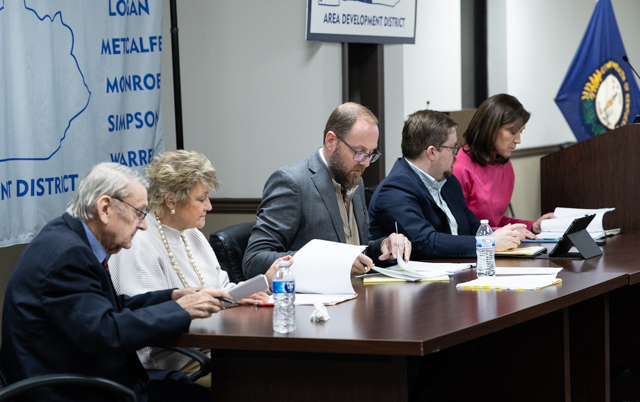Simpson Judge-Executive Barnes faces ethics hearing
Published 6:00 am Saturday, February 1, 2025

1/10
Swipe or click to see more
Simpson County Judge-Executive Mason Barnes listens as community members voice their complaints against him during an ethics hearing in the Barren River Area Development District conference room on Wednesday, Jan. 29, 2025.
GRACE MCDOWELL / DAILY NEWS

2/10
Swipe or click to see more
Simpson County Judge Executive Mason Barnes answers questions regarding accusations made last year of using his position as judge-executive to receive personal financial gain through his construction business and of unprofessional conduct with other local officials as members of the Barren River Area Development District board committee hold an ethics hearing in the BRADD conference room on Wednesday, Jan. 29, 2025. The hearing concluded with the committee members stating they will reach a decision on the matter within the next 30 days.
GRACE MCDOWELL / DAILY NEWS

3/10
Swipe or click to see more
Members of the Barren River Area Development District board committee hold an ethics hearing to address accusations made last year against Simpson County Judge-Executive Mason Barnes that he used his position as judge-executive to receive personal financial gain through his construction business and exhibited unprofessional conduct with other local officials in the BRADD conference room on Wednesday, Jan. 29, 2025. The hearing concluded with the committee members stating they will reach a decision on the matter within the next 30 days.
GRACE MCDOWELL / DAILY NEWS

4/10
Swipe or click to see more
Simpson County Judge Executive Mason Barnes swears to answer truthfully before answering questions at an ethics hearing in the BRADD conference room on Wednesday, Jan. 29, 2025.
GRACE MCDOWELL / DAILY NEWS

5/10
Swipe or click to see more
Simpson County Judge Executive Mason Barnes answers questions regarding accusations made last year of using his position as judge-executive to receive personal financial gain through his construction business and of unprofessional conduct with other local officials as members of the Barren River Area Development District board committee hold an ethics hearing in the BRADD conference room on Wednesday, Jan. 29, 2025. The hearing concluded with the committee members stating they will reach a decision on the matter within the next 30 days.
GRACE MCDOWELL / DAILY NEWS

6/10
Swipe or click to see more
Members of the Barren River Area Development District board committee hold an ethics hearing to address accusations made last year against Simpson County Judge-Executive Mason Barnes that he used his position as judge-executive to receive personal financial gain through his construction business and exhibited unprofessional conduct with other local officials in the BRADD conference room on Wednesday, Jan. 29, 2025. The hearing concluded with the committee members stating they will reach a decision on the matter within the next 30 days.
GRACE MCDOWELL / DAILY NEWS

7/10
Swipe or click to see more
Simpson County Judge Executive Mason Barnes answers questions regarding accusations made last year of using his position as judge-executive to receive personal financial gain through his construction business and of unprofessional conduct with other local officials as members of the Barren River Area Development District board committee hold an ethics hearing in the BRADD conference room on Wednesday, Jan. 29, 2025. The hearing concluded with the committee members stating they will reach a decision on the matter within the next 30 days.
GRACE MCDOWELL / DAILY NEWS

8/10
Swipe or click to see more
Simpson County Judge Executive Mason Barnes answers questions regarding accusations made last year of using his position as judge-executive to receive personal financial gain through his construction business and of unprofessional conduct with other local officials as members of the Barren River Area Development District board committee hold an ethics hearing in the BRADD conference room on Wednesday, Jan. 29, 2025. The hearing concluded with the committee members stating they will reach a decision on the matter within the next 30 days.
GRACE MCDOWELL / DAILY NEWS

9/10
Swipe or click to see more
Simpson County Judge Executive Mason Barnes listens as members of the the Barren River Area Development District board committee open an ethics hearing regarding him in the BRADD conference room on Wednesday, Jan. 29, 2025.
GRACE MCDOWELL / DAILY NEWS

10/10
Swipe or click to see more
Simpson County Judge-Executive Mason Barnes listens as community members voice their complaints against him during an ethics hearing in the Barren River Area Development District conference room on Wednesday, Jan. 29, 2025.
GRACE MCDOWELL / DAILY NEWS
An ethics hearing for Simpson County Judge-Executive Mason Barnes was held at the Barren River Area Development District on Wednesday after Barnes was accused last year of using his position as judge-executive to receive personal financial gain through his construction business.
No finding was made Wednesday after the testimony.
A letter of complaint from a citizens group that was signed by some Franklin city officials alleged that Barnes, who owns the construction company Mason Barnes Construction, used his position as judge-executive to “receive preferential treatment” permitting the company to start building a house on property that was zoned for Interstate Interchange Business District.
The Barren River Regional Ethics Board heard the complaint. Two complainants were present Wednesday — Simpson County resident Joel Peyton and Franklin’s Planning and Zoning Administrator, Carter Munday.
The complaint letter states that construction on the house began “months before” the area was rezoned. The letter alleges Barnes did not recuse himself from a vote on the first or second reading of the rezoning by Simpson County Fiscal Court.
“It undermines the integrity of our local government,” Peyton told the board.
Peyton told the Daily News after the hearing that he views Barnes’ vote as a conflict of interest.
“If you’re a home builder and you’re an elected official, you should be saying ‘OK, I have a conflict of interest, I shouldn’t be voting on this,’ ” Peyton said.
In his testimony Wednesday, Barnes stated he was not in attendance at the planning and zoning meeting where the property was rezoned.
“I did not attend that meeting,” Barnes stated. “To be quite honest, I attend very, very few planning and zoning meetings simply for the fact that I don’t want anyone on the Planning and Zoning Commission to feel as though my presence in that meeting as the county judge is trying to influence them one way or the other.”
Barnes testified that he could not remember when his company started construction on the home, nor could he remember the date of the rezoning.
Rezoning ordinances go through a first and second reading process at fiscal court, each requiring a vote from magistrates. If there is a majority “yes” vote on the second reading, the change is set.
Barnes stated he did not make a motion on either reading and did not second any motions on the readings.
“I didn’t think about it at all from the perspective of (the) home, or building a home,” Barnes told the committee.
When asked by his attorney David Broderick if Simpson County Attorney Sam Phillips recommended to Barnes that he not vote on the rezoning, Barnes responded, “no sir, he did not.”
“Quite often in our meetings, we turn to the county attorney and ask, are we handling this right,” Barnes said. “Other times, he will just simply stop and interject if we’re doing something to keep things (from) being improper.”
Section 5 of the Simpson County Code of Ethics states that no public official should engage in a business or activity that is in “substantial conflict” with the official’s duties, and no official or employee should use their position in the county “to secure unwarranted privileges or advantages.”
Barnes cited in the hearing another portion of this section, which states no official can be held in violation of this as long as an official does not receive any benefit that could not be obtained by any other member of the public or a business.
The findings of the hearing were taken up in executive session Wednesday with a decision expected within the next 30 days.
About Jack Dobbs
Jack covers city government for the Daily News. Originally from Simpson County, he attended Western Kentucky University and graduated in 2022 with a degree in journalism.
 More by Jack
More by Jack





























